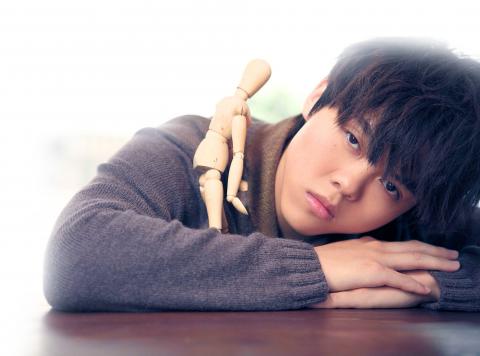Some forlorn souls turn to the bottle, others favor the psychoanalyst’s couch. But pop newcomer Henry Tseng (曾昱嘉) has a healthier, and cheaper, alternative: his music.
“My songs are sad but ultimately therapeutic,” Tseng told the Taipei Times in a phone interview earlier this week. “I hope they will give listeners the strength to stand up again.”
The rising star performs a solo concert at Riverside Live House (西門紅樓展演館) tomorrow night.

Photo Courtesy of Seed Music
Tseng won the fourth season of the hit TV talent show Super Idol (超級偶像) last year. His debut album Listen, 10 delicately crafted gems about romantic obsession and the ability to survive heartbreak, received plaudits when it was released in December.
“These 10 songs tell 10 different love stories,” Tseng. “I hope audiences will find their own stories in these songs.”
In contrast to the more explosive vocals usually associated with male Mando-pop singers, Tseng’s delicate and emotionally charged delivery is similar to that of Maggie Chiang (江美棋) and Fish Leong (梁靜茹).
“In private, I’m pretty silly and outgoing,” he said. “But to sing, I draw on my sensitive side.”
In the music video to Not Enough Tears (眼淚不夠), the second single release from Listen, Tseng portrays an angel who descends to Earth to collect people’s tears and thus take their sadness away.
“My role as a singer, as I see it, is to help people shed their tears and renew their faith in life,” Tseng said.
He cites Eason Chan (陳奕迅) as his favorite singer. “The best singing is not about technical prowess,” he said. “It’s about conveying emotions and allowing people to reminisce and make peace with their life experiences.”
In order to realize his dream of becoming a pop star, Tseng shed 15kg, dropping from 85kg to 70kg within three months, while competing on Super Idol.
“I was in a rush to lose weight and didn’t do it so healthily,” Tseng said. “But I encourage people to lose weight in a healthy way, with a balanced diet, exercise and lots of water.”

When the South Vietnamese capital of Saigon fell to the North Vietnamese forces 50 years ago this week, it prompted a mass exodus of some 2 million people — hundreds of thousands fleeing perilously on small boats across open water to escape the communist regime. Many ultimately settled in Southern California’s Orange County in an area now known as “Little Saigon,” not far from Marine Corps Base Camp Pendleton, where the first refugees were airlifted upon reaching the US. The diaspora now also has significant populations in Virginia, Texas and Washington state, as well as in countries including France and Australia.

On April 17, Chinese Nationalist Party (KMT) Chairman Eric Chu (朱立倫) launched a bold campaign to revive and revitalize the KMT base by calling for an impromptu rally at the Taipei prosecutor’s offices to protest recent arrests of KMT recall campaigners over allegations of forgery and fraud involving signatures of dead voters. The protest had no time to apply for permits and was illegal, but that played into the sense of opposition grievance at alleged weaponization of the judiciary by the Democratic Progressive Party (DPP) to “annihilate” the opposition parties. Blamed for faltering recall campaigns and faced with a KMT chair

Article 2 of the Additional Articles of the Constitution of the Republic of China (中華民國憲法增修條文) stipulates that upon a vote of no confidence in the premier, the president can dissolve the legislature within 10 days. If the legislature is dissolved, a new legislative election must be held within 60 days, and the legislators’ terms will then be reckoned from that election. Two weeks ago Taipei Mayor Chiang Wan-an (蔣萬安) of the Chinese Nationalist Party (KMT) proposed that the legislature hold a vote of no confidence in the premier and dare the president to dissolve the legislature. The legislature is currently controlled

As we live longer, our risk of cognitive impairment is increasing. How can we delay the onset of symptoms? Do we have to give up every indulgence or can small changes make a difference? We asked neurologists for tips on how to keep our brains healthy for life. TAKE CARE OF YOUR HEALTH “All of the sensible things that apply to bodily health apply to brain health,” says Suzanne O’Sullivan, a consultant in neurology at the National Hospital for Neurology and Neurosurgery in London, and the author of The Age of Diagnosis. “When you’re 20, you can get away with absolute